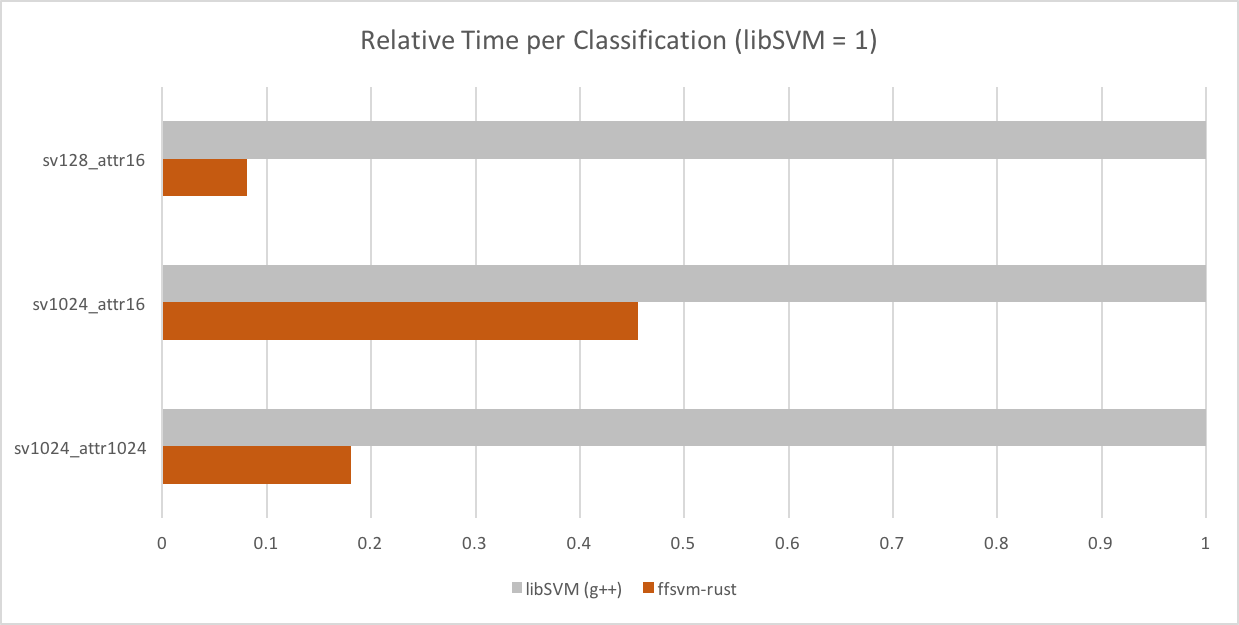Expand description
§In One Sentence
You trained an SVM using libSVM, now you want the highest possible performance during (real-time) classification, like games or VR.
§Highlights
- loads almost all libSVM types (C-SVC, ν-SVC, ε-SVR, ν-SVR) and kernels (linear, poly, RBF and sigmoid)
- produces practically same classification results as libSVM
- optimized for SIMD and can be mixed seamlessly with Rayon
- written in 100% safe Rust
- allocation-free during classification for dense SVMs
- 2.5x - 14x faster than libSVM for dense SVMs
- extremely low classification times for small models (e.g., 128 SV, 16 dense attributes, linear ~ 500ns)
- successfully used in Unity and VR projects (Windows & Android)
§Usage
Train with libSVM (e.g., using the tool svm-train), then classify with ffsvm-rust.
From Rust:
// Replace `SAMPLE_MODEL` with a `&str` to your model.
let svm = DenseSVM::try_from(SAMPLE_MODEL)?;
let mut fv = FeatureVector::from(&svm);
let features = fv.features();
features[0] = 0.55838;
features[1] = -0.157895;
features[2] = 0.581292;
features[3] = -0.221184;
svm.predict_value(&mut fv)?;
assert_eq!(fv.label(), Label::Class(42));§Status
- December 14, 2024: After 7+ years, finally ported to stable.🎉🎉🎉
- March 10, 2023: Reactivated for latest Rust nightly.
- June 7, 2019: Gave up on ‘no
unsafe’, but gained runtime SIMD selection. - March 10, 2019: As soon as we can move away from nightly we’ll go beta.
- Aug 5, 2018: Still in alpha, but finally on crates.io.
- May 27, 2018: We’re in alpha. Successfully used internally on Windows, Mac, Android and Linux on various machines and devices. Once SIMD stabilizes and we can cross-compile to WASM we’ll move to beta.
- December 16, 2017: We’re in pre-alpha. It will probably not even work on your machine.
§Performance

All performance numbers reported for the DenseSVM. We also have support for SparseSVMs, which are slower
for “mostly dense” models, and faster for “mostly sparse” models (and generally on the performance level of libSVM).
§Tips
- Compile your project with
target-cpu=nativefor a massive speed boost (e.g., check our.cargo/config.tomlhow you can easily do that for your project). Note, due to how Rust works, this is only used for application (or dynamic FFI libraries), not library crates wrapping us. - For an x-fold performance increase, create a number of
Problemstructures, and process them with Rayon’spar_iter.
§FAQ
Structs§
- DenseSVM
- An SVM using SIMD intrinsics optimized for speed.
- Feature
Vector - A single feature vector (“problem”) an SVM should classify.
- Model
File - Parsing result of a model file used to instantiate a
DenseSVMorSparseSVM. - SparseSVM
- an SVM optimized for large models with many empty attributes.
Enums§
Traits§
- Predict
- Implemented by
DenseSVMandSparseSVMto predict aFeatureVector.
Type Aliases§
- Dense
Features - Feature vectors produced for
DenseSVMs. - Sparse
Features - Feature vectors produced for
SparseSVMs.


